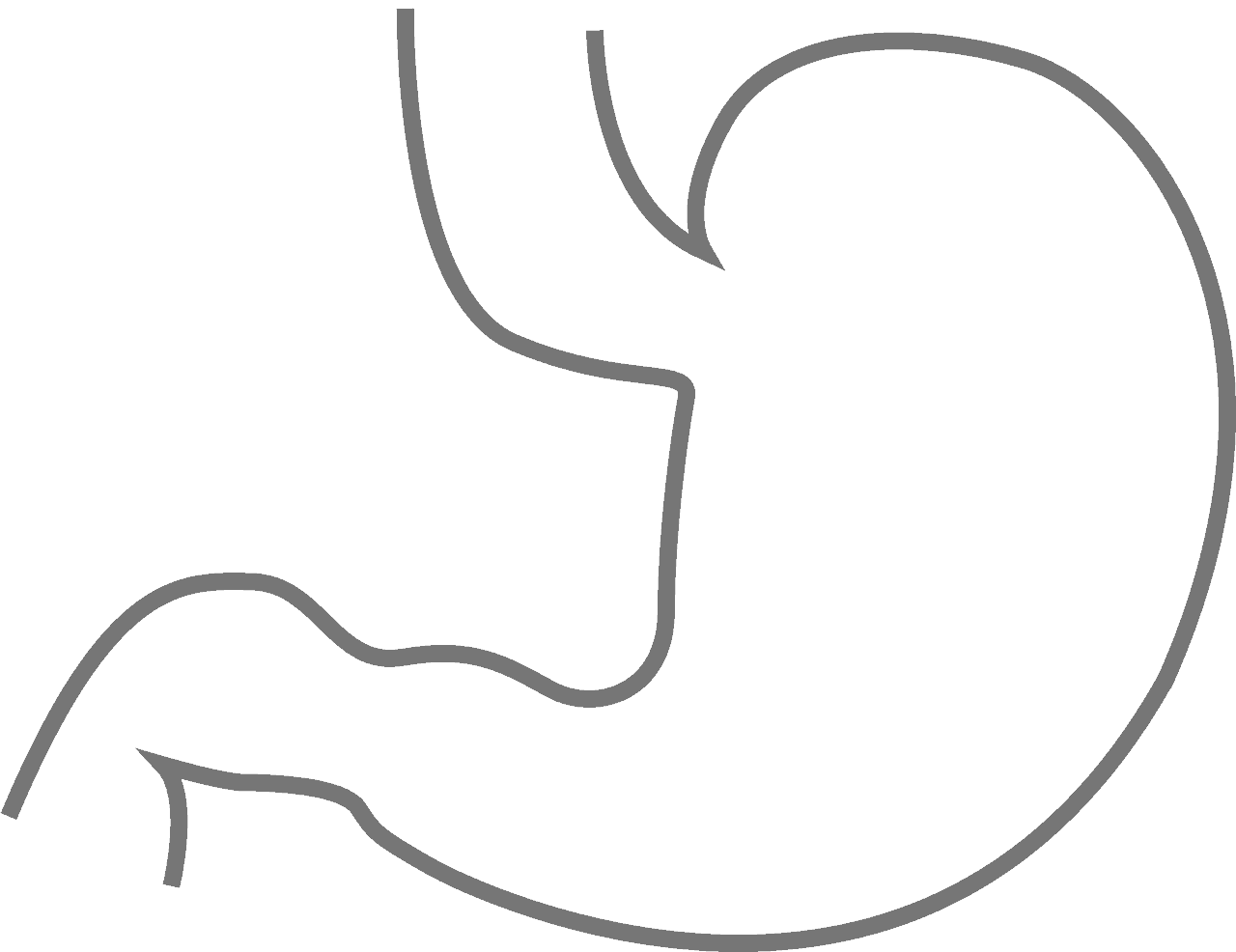Digestion – it’s what the body does to create the energy we need to keep going every day. On the most basic level, without proper digestion, no other body process will work ideally. This includes weight loss. Before jumping right into how digestion affects weight loss, let’s take a look at what digestion really is.
What is Digestion?
Digestion is defined as “the process of breaking down food by mechanical and enzymatic action in the alimentary canal into substances that can be used by the body.” Basically, digestion reduces the food you eat into smaller pieces that the intestines can process for nutrient absorption and other functions. There are various stages in the digestive process.
Stages of Digestion
There are six parts to the digestive process. Each part prepares the food for the following part. The six stages are:
Ingestion: Food enters the mouth where it is chewed and swallowed. As you’re chewing, enzymes break down the food before propulsion.
Propulsion: Propulsion is the movement of the food through the digestive or intestinal tract. When you swallow, you are practicing voluntary propulsion. When the food moves through the digestive tract via muscles, your body is practicing involuntary propulsion or peristalsis.
Mechanical/Physical Digestion: Mechanical and physical digestion occurs mostly in the mouth. Mastication, or the process of chewing, break food into smaller pieces with more surface area. As the food moves into the stomach and mixes with fluids there, it turns into a soup of sorts, called chyme.
Chemical Digestion: After the food moves from the mouth to the stomach, chemical digestion occurs. Chemical digestion actually starts when food is first placed in the mouth. Enzymes present in saliva start the breakdown of food before you even finish chewing. Here is where foods are broken down into the familiar macronutrients – proteins, carbohydrates, and fats.
Absorption: If the food you eat doesn’t breakdown enough to enter blood for transportation around the body where the nutrients are used for a variety of processes, nutrients cannot be absorbed. By the time food reaches the small intestine, the previous stages will have prepared the food for absorption before the final step of defecation.
Defecation: Aside from swallowing, defecation is the only voluntary part of the digestion process. Once food has been thoroughly processed through the stomach and intestines, what’s left is waste that the body eliminates. (Lumen Learning)
Organs that play a part in the digestive process include the gastrointestinal tract (mouth, stomach, intestines, etc.), pancreas, liver, and gallbladder.
Eating the right foods, whether for digestion or weight loss, can be hard to wrap your head around. Some foods that were once considered healthy may not be the best nutritionally and vice versa. With Noom, you can track the foods you eat, so you know what you’re supplying to your body. Download your free trial offer today!

Digestion and Nutrients
The nutrients in your food come into play, starting in the small intestine. When food has been processed through the gastrointestinal tract to the small intestine, it’s broken down into manageable parts. In the small intestine, digestive juice is released to break down the food further. As the small intestine absorbs water from food, it also absorbs nutrients found in the water. The water contains nutrients from the foods you’ve consumed. It can take upwards of 24+ hours for the body to complete the digestive process.
After nutrients are absorbed by the small intestine, they are packed into the blood, where the circulatory system passes the nutrients around the body to different organs and processes that need them. All-natural elements in foods help with growth, energy, and cellular repair. (NIH-NIDDK)
Digestion and Appetite
The real connection between digestion and appetite comes with the nutrients found in foods. The big two are protein and fiber. Both slow the digestive process to the point that it helps you feel fuller longer than you would if you ate a meal or snack without sufficient protein and fiber. Water content also plays a role – let’s take a look at each.
Protein: Simply put, “protein takes longer to digest than carbohydrates do, which explains why it can suppress appetite.” It looks like consuming more protein helps strengthen the effect, but too much protein can be converted to carbohydrates and stores as fat – so there’s a careful balance between digestion proteins to reduce appetite and taking in too much protein. (Harvard Health Publishing)
Fiber: Similar to protein, fiber slows the digestive process. The real benefit when it comes to digestion and appetite with fiber is that the body cannot fully digest it. When the body can’t digest fiber, it moves into the digestive tract, where it forms bulk in waste. The fiber helps move waste out of the digestive system through defecation.
Now, unfortunately, as is the case some of the time, the research into how fiber works to reduce appetite is up in the air. Research from 2013 claims fiber doesn’t have an impact on appetite as it did not reduce the intake of food or energy. Basically, participants eating a higher-fiber diet didn’t eat less. (Journal of the American College of Nutrition)
However, 2017 research shows a connection between fiber intake and appetite – so scientists are not quite sure, but we know, without hesitation, that eating more fiber is ideal for overall health, especially colon health. (Food and Nutrition Research)
Digestion and Probiotics
What are probiotics and prebiotics?
“Probiotics are live microorganisms that are intended to have health benefits when consumed or applied to the body. They can be found in yogurt and other fermented foods, dietary supplements, and beauty products.
Although people often think of bacteria and other microorganisms as harmful “germs,” many are actually helpful. Some bacteria help digest food, or produce vitamins. Many of the microorganisms in probiotic products are the same as or similar to microorganisms that naturally live in our bodies.” (National Center for Complementary and Integrative Health)
Prebiotics are the foods probiotics eat – so without prebiotics, probiotic microbiomes, as the communities are called, would thrive and flourish to help with digestion and nutrient absorption, among the many other probiotics functions. Prebiotics are degraded in the gastrointestinal tract, where short-chain fatty acids are released into the bloodstream.
Despite the clear role of probiotics in overall health, some health conditions do not support using the live bacteria, especially in cases where a patient has a compromised immune system. (Therapeutic Advances in Gastroenterology)
Probiotics and Weight Loss
You can venture to say that because probiotics play a role in digestion that they could also play a role in weight loss, or so some proponents suggest. During obesity, the gut microbiota changes – and not in a good way. Reestablishing a healthy probiotic community may support gut health to the point that foods and nutrients are processed and absorbed more efficiently. As for the research, “Probiotics have been shown to influence the composition of the gut microbiota, improve gut integrity, and restore the microbial shifts characteristic of obesity.” (Nutrients)
We also found research that showed supplementation with synbiotics “may increase weight management effects due to synergistic effect on short-chain fatty acid production and microbiota ‘re-configuration.’ (European Review for Medical and Pharmacological Sciences)
Now, that doesn’t mean that all research supports the use of probiotics for weight loss. According to another review of research, there’s no solid connection between probiotics and weight management. The study authors suggested, “control of diet and environmental and lifestyle factors that favor obesity development remain the best solution to problems related to weight gain.” (Nutrients)
Unfortunately, additional research offers the same outcome. After a review of all research completed prior to 2018, probiotics were not shown to affect weight loss. (Obesity Reviews)
So, in terms of probiotics, there’s a chance you could notice some changes in weight, but the changes will indirectly be associated with changes in digestion, food utilization, nutrient use and absorption, fluid intake, and defecation.
Foods That are Easy to Digest
Battling effectiveness with digestive health and comfort is something we all do at some point. Some foods are difficult for the body to digest, making for an increase in the likelihood of complex carbohydrates packed with exceptional nutrient profiles. Food that is easy on digestion isn’t necessarily food you want in a weight-loss plan.
Let’s take a look at the most easily digested foods and how these foods work against your weight loss.
The first part of healthy foods to consider, in terms of digestion, is fiber. The average person consumes about half the total fiber intake they should daily. That means the average person takes in less than 15g of fiber, whereas the amount should be closer to 35g.
Foods that are easiest on digestion tend to be cooked or processed, so the total amount of fiber is reduced. For instance:
One fresh pear may contain upwards of 5g of fiber, whereas a can of processed pears comes in at less than 3g. This change may not seem like much, but when total fiber intake is around 15g a day, that 3g accounts for ⅕ of the total fiber a person is taking in for the entire day.
Other foods that are easy to digest, and likely very low in fiber, include:
- Canned fruits
- Canned vegetables
- Ground meat
- Refined grains
- White bread, pasta, and rice
All-in-all you’re looking for foods that contain fewer than 2g of fiber per serving. How does that play into digestion and weight loss?
One factor is in the nutritional profile of the foods that are easy to digest. Most are cooked or processed, removing some of the best nutrients and, as covered, fiber. As we touch back on fiber, this carbohydrate is not digestible, so it has no effect on hunger, but it can slow digestion, so you feel full for a longer time after eating. Basically, digestion slows, and that could help you lose weight.
Foods That are Hard to Digest
Moving on to foods that are more difficult to digest, we see the fiber comes back into play, but so do some foods you want to skip when trying to lose weight. Here is just a small sample of the foods that are difficult to digest that may have an effect on weight.
Fried Foods
The foods you’re frying may not be unhealthy or difficult to digest, but cooking in oil can cause havoc in your intestines. High-fat foods can cause diarrhea, gas, and bloating.
High-Fiber Fruits
Here, again, is fiber. You can guarantee that every food naturally high in fiber is also one that works as a weight-loss food. Difficult digestion could mean slower digestion, and that means eating less often, so you lose weight.
Artificial Additives
Artificial ingredients, like sugar substitutes, can gas, bloating, cramping, and diarrhea because they cannot be digested. While the calorie count is near zero, the impact on gastrointestinal comfort, and health, are to be taken into consideration before indulging in that bag of sugar-free gummy bears. Plus, not all sugar-free foods, made with artificial sweeteners, are all low in calories, and most are high in fat.
Beans
Here comes fiber again. Beans are a fantastic source of fiber. As discussed, fiber is indigestible, and it passes through the digestive system without being broken down. This is what causes the bulk when fiber is used as a natural laxative. However, it is the indigestible nature of the fiber in beans that make them helpful for weight loss.
Green-Leafy Vegetables
Another of the best weight-loss foods is also on the list of one of the hardest foods to digest. Green leafy vegetables contain a wealth of nutrients, vitamins, minerals, and yes, our new favorite friend, fiber. You may find green-leafy vegetables and other foods like cabbage and similar vegetables, called roughage. This is because the foods give stool bulk and help waste move efficiently out of the body.
Spicy Foods and Treats
There is a connection between spicy foods and weight loss – if only because the spice slows down the pace at which you eat a meal. However, the same element of spicy foods that help weight loss is also the element that makes it hard for digestion. It is thought that the part of peppers that make them hot, capsaicin, is what causes discomfort like heartburn and indigestion. These are both symptoms of issues with digestion.
You can eat foods that are easy to digest and foods that are more difficult to digest and lose weight. With a personalized weight-loss plan based on psychology and just 10 minutes, a day is all you need to lose weight with the foods you love – check out the Noom free trial offer.
Symptoms and Side Effects of Poor Digestion
If you’re having difficulty digesting foods, or your body isn’t digesting foods properly, you may notice some side effects. Side effects of poor digestion may include:
- Changes in weight
- Difficulty sleeping
- Poor sleep quality
- Fatigue
- Irritated skin
- Bad breath
- Constipation
Last Look at Digestion and Weight Loss
What’s the final take on digestion and weight loss. The foods you eat play a critical role in body weight, health, wellness, energy, and every process the body voluntarily or involuntarily works through each day. When digestion is optimal, the body works through food starting in the mouth, moving into the stomach and intestines, and back out again without trouble. Difficult digesting can make it hard to stick with a healthy eating plan, especially if you’re experiencing side effects like constipation, gas, bloating, and cramping from certain “healthy” foods. While digestion may not have a direct role in weight loss, the function it plays in the digestive and absorption process make it possible to get all the nutrients you need to stay healthy when losing weight.
Research into Digestion and Weight Loss
Reducing intestinal digestion and absorption of fat
ACS Nano
When nanocellulose was ingested, it “reduced the absorption of ingested fat and thereby assist[ed] in weight loss and the management of obesity.”
The gut microbiome and its role in obesity
Nutrition Today
“Obesity and obesity-related metabolic conditions are characterized by specific alterations in the composition and function of the human gut microbiome.” This raises the possibility that addressing the issues in the gut microbiome may have a positive impact on weight.
Is it time to use probiotics to prevent or treat obesity?
Nutrients
Though research evidence exists showing probiotics can have an impact on obesity, there are also studies that show no such effect. This leaves the relationship between gut health, digestion, and weight loss in debate.
Weight-loss interventions and gut microbiota changes in overweight and obese patients: a systematic review
Obesity Reviews
Those prebiotics we discussed earlier? It looks like they may have an impact on reducing body fat. Weight-loss programs like bariatric surgery and restrictive diets may have a negative impact on colon health as associated with gut microbiota.
Effect of high-fat diet and obesity on gastrointestinal motility
Annals of Translational Medicine
What happens to the gut with a high-fat diet and obesity? Through various complicated processes, it appears that during obesity, the absorption of nutrients is altered, and the signals that tell the brain you’re full (the ones originating in the small intestine) are not delivered.
Obesity and the Gastrointestinal System
We’ve looked at the relationship between digestion and weight loss, but what about the impact of obesity on digestion and the gastrointestinal system?
Gastrointestinal complications of obesity
As per Gastroenterology, people who are obese often develop gastro-related conditions.
Insights into the role of gut microbiota in obesity: pathogenesis, mechanisms, and therapeutic perspectives
Protein & Cell
“Variation in gut microorganisms might play an important role in the pathogenesis of obesity. Although the composition of intestinal microbiota is highly diverse in healthy individuals, those exhibiting overall adiposity, insulin resistance, and dyslipidemia are characterized by low bacterial richness.”
Gastrointestinal symptoms in obesity
Frontiers in Medicine
When obese and non-obese individuals were compared, the obese individuals reported more instances of gastrointestinal symptoms, both in the upper and lower gastro tract. The symptoms included stomach pain and changes in bowel habits.
Obesity and microbiota: an example of an intricate relationship
Genes & Nutrition

Final Take on Digestion and Weight Loss
We know, without a doubt, that the digestive system plays a role in weight loss, weight maintenance, and weight gain, but the exact relationship is unclear. It is generally agreed that the “observed anti-obesity effects of probiotics and prebiotic therapies are still obscure.”
We’re all about supporting healthy lifestyle changes, which is why we’ve decided to support the app Noom. We love everything about the free trial offer from the personalized weight-loss programs to the human coaches and the interface designed over more than five years by doctors who want you to succeed. There’s nothing like Noom on the market and now you get a free trial offer.
Guide to Digestion and Weight Loss Questions & Answers
Improving your digestion and losing weight can be achieved through a combination of healthy lifestyle changes. There are several simple steps you can take to improve your digestive health, such as eating more fiber-rich foods, drinking plenty of water, and avoiding processed foods. Additionally, regular exercise can help speed up metabolism and burn calories, aiding in weight loss efforts.
Article Sources
- https://courses.lumenlearning.com/ap2/chapter/digestive-system-processes-and-regulation/
- https://noom.8utb.net/c/1720052/500038/8591
- https://www.niddk.nih.gov/health-information/digestive-diseases/digestive-system-how-it-works
- https://www.health.harvard.edu/staying-healthy/extra-protein-at-breakfast-helps-control-hunger
- https://www.ncbi.nlm.nih.gov/pubmed/23885994
- https://www.ncbi.nlm.nih.gov/pmc/articles/PMC5510210/
- https://nccih.nih.gov/health/probiotics/introduction.htm
- https://www.ncbi.nlm.nih.gov/pmc/articles/PMC3002586/
- https://www.ncbi.nlm.nih.gov/pmc/articles/PMC6412733/
- https://pubmed.ncbi.nlm.nih.gov/30468509/
- https://www.ncbi.nlm.nih.gov/pmc/articles/PMC6266556/
- https://www.ncbi.nlm.nih.gov/pubmed/29047207
- https://noom.8utb.net/c/1720052/500038/8591
- https://www.ncbi.nlm.nih.gov/pubmed/29874029
- https://www.ncbi.nlm.nih.gov/pmc/articles/PMC5082693/
- https://www.ncbi.nlm.nih.gov/pmc/articles/PMC6266556/
- https://www.ncbi.nlm.nih.gov/pubmed/28524627
- https://www.ncbi.nlm.nih.gov/pmc/articles/PMC3890396/
- https://www.ncbi.nlm.nih.gov/pmc/articles/PMC5609829/
- https://www.ncbi.nlm.nih.gov/pmc/articles/PMC5960470/
- https://www.ncbi.nlm.nih.gov/pmc/articles/PMC4292065/
- https://www.ncbi.nlm.nih.gov/pmc/articles/PMC5473000/
- https://noom.8utb.net/c/1720052/500038/8591
- https://noom.8utb.net/c/1720052/500038/8591
Partner with Us!
Looking to promote your weight-loss products or services?
Our platform reaches a dedicated audience actively seeking the best solutions. Contact us to explore advertising opportunities and grow your brand with us.
Get in Touch

